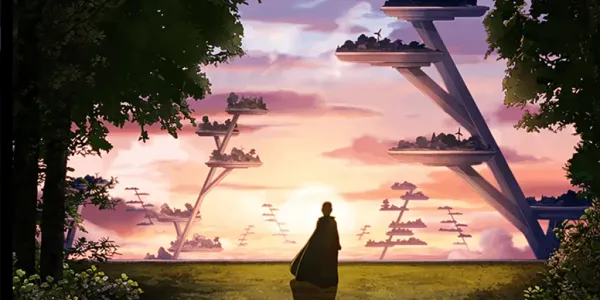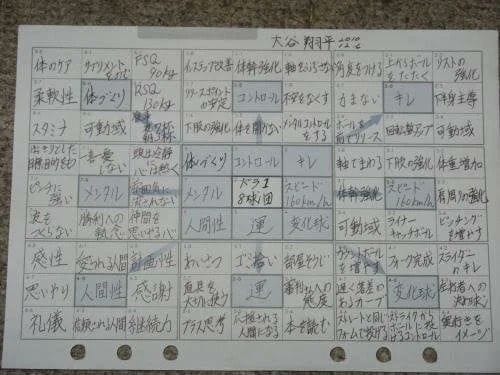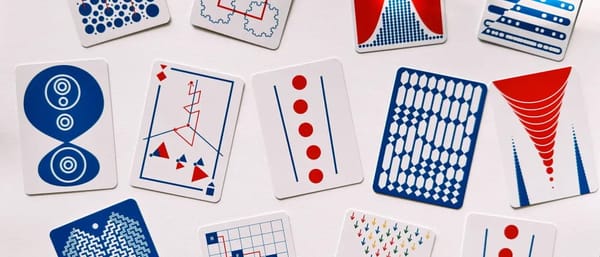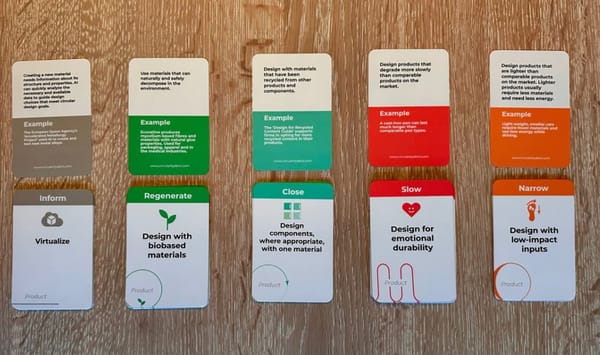№ 92 | Ask This Book A Question, Jackdaw Folders, The Wizards & Workshops Deck, NOISE Analysis + SOLVED Cards, “How Economics Fails to Account for the Climate Crisis”, and TWO 🤯 ‘What If…?’ Questions
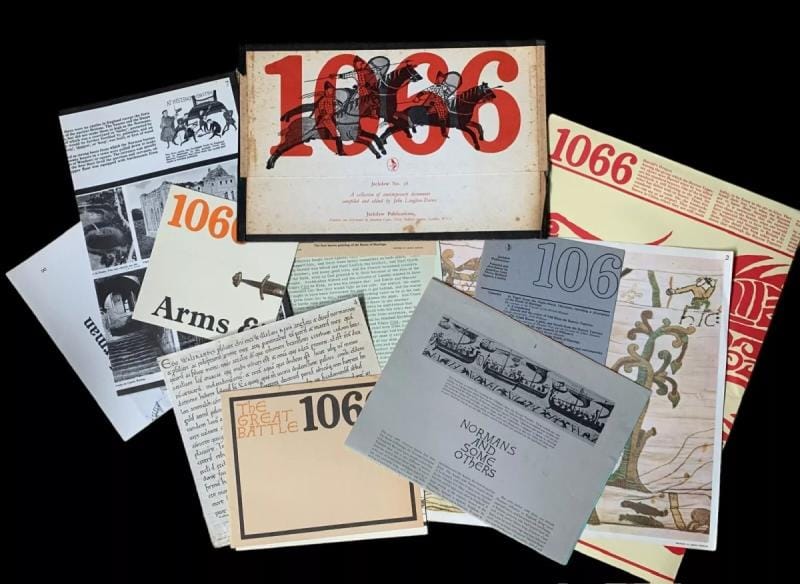
Look who’s back—with more playful things to think with!
Ask This Book A Question
Ask This Book A Question is described as “an interactive game [emphasis mine] that empowers you to understand yourself in a new way, inviting you on a playful journey of self-discovery.” I love publications like this that blur the lines between traditional book, workbook, and zine, to make the content—in this case making decisions—feel more playful. Oh, and I love any publication that explores the interplay of pictures and words. You can read an interview with the author here: “Product Designer Writes Book on Improving the Decision-Making Process.”
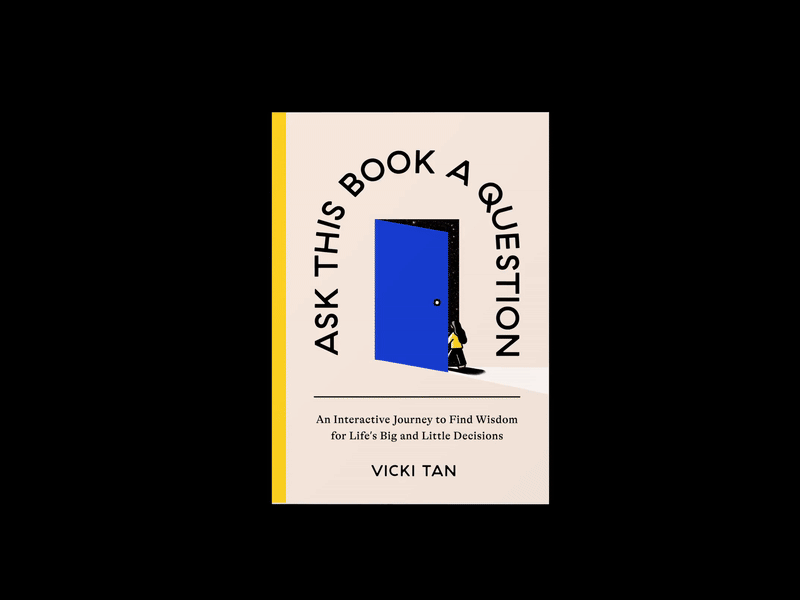
Jackdaw Folders
There’s something engaging and almost… immersive [?] about interacting with the primary sources upon which history is based. For a time, I had a monthly subscription to History By Mail, which mails out replicas of fascinating historical documents.
I mention this as my friend Matt Ballantine recently shared this reference to Jackdaw Folders—folders filled with reproduction copies of primary and secondary source documents related to various historical topics.
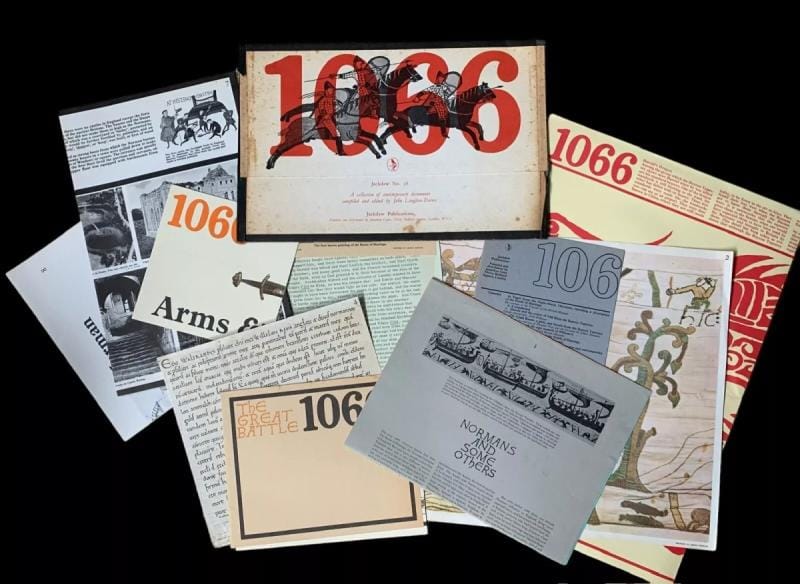
That alone sounds like the makings of a playful thing to think with! And for a time (between 1963 and 1977) Jackdaw Folders were a popular learning resource:
They were aligned with innovative educational theories at the time, they were flexible and adaptable to diverse contexts, and they were interesting and exciting for students.
“Interesting and exciting for students.” 🙂
“The rise and fall of Jackdaws: lessons for designing source collections to teach history,”provides more details on this learning tool, including critical commentary as to why Jackdaws were a ‘brilliant idea, flawed execution.’
Reading these folios left me thinking about what a relaunch of Jackdaw Folders might look like today, and what kinds of scaffolding could we add to make these more effective as educational tools…? 🤔
The Wizards & Workshops deck
Here’s a simple card deck (still at the prototype stage) made exponentially better through a bit of whimsy and imagination. The Wizards & Workshops Deck is a small set of fantasy themed ‘kudos’ cards—participants can give to each other during a workshop.
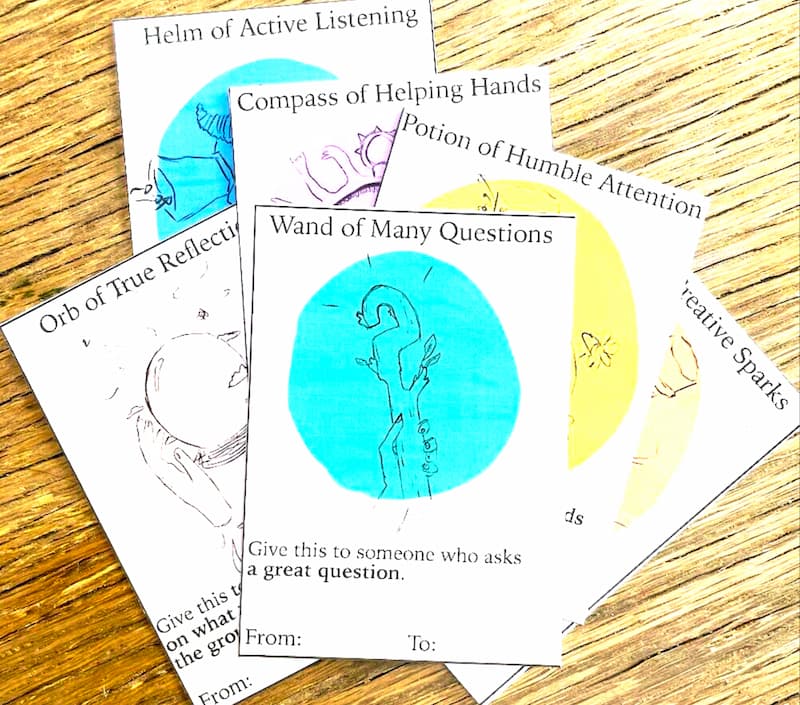
“Wouldn’t it be cool if we had kudos cards we could share with one another when we saw these facilitation skills in action?” 💡
After some doodling and back and forth chats, we came up with the Wizards & Workshops deck: a set of cards for core facilitation skills which we invited the team to give to other participants when they saw this skill in action. 🪄
Everyone received a set of six core cards that included items like the Wand of Many Questions or the Orb of True Reflection. Participants would write their name and the person they were giving the card to when then saw a great demonstration of a skill in action. We found these core cards to be a great training aid that also supported peer-learning and general good vibes throughout the retreat.
On Day 3, we introduced an additional set of cards that widened the space to include more advanced facilitation skills and others just for fun. (NGL, the Lute of Good Times is probably my favourite 🎻 )
😍
NOISE Analysis + SOLVED Cards
Yay—another “learning games” example of cards on a board!
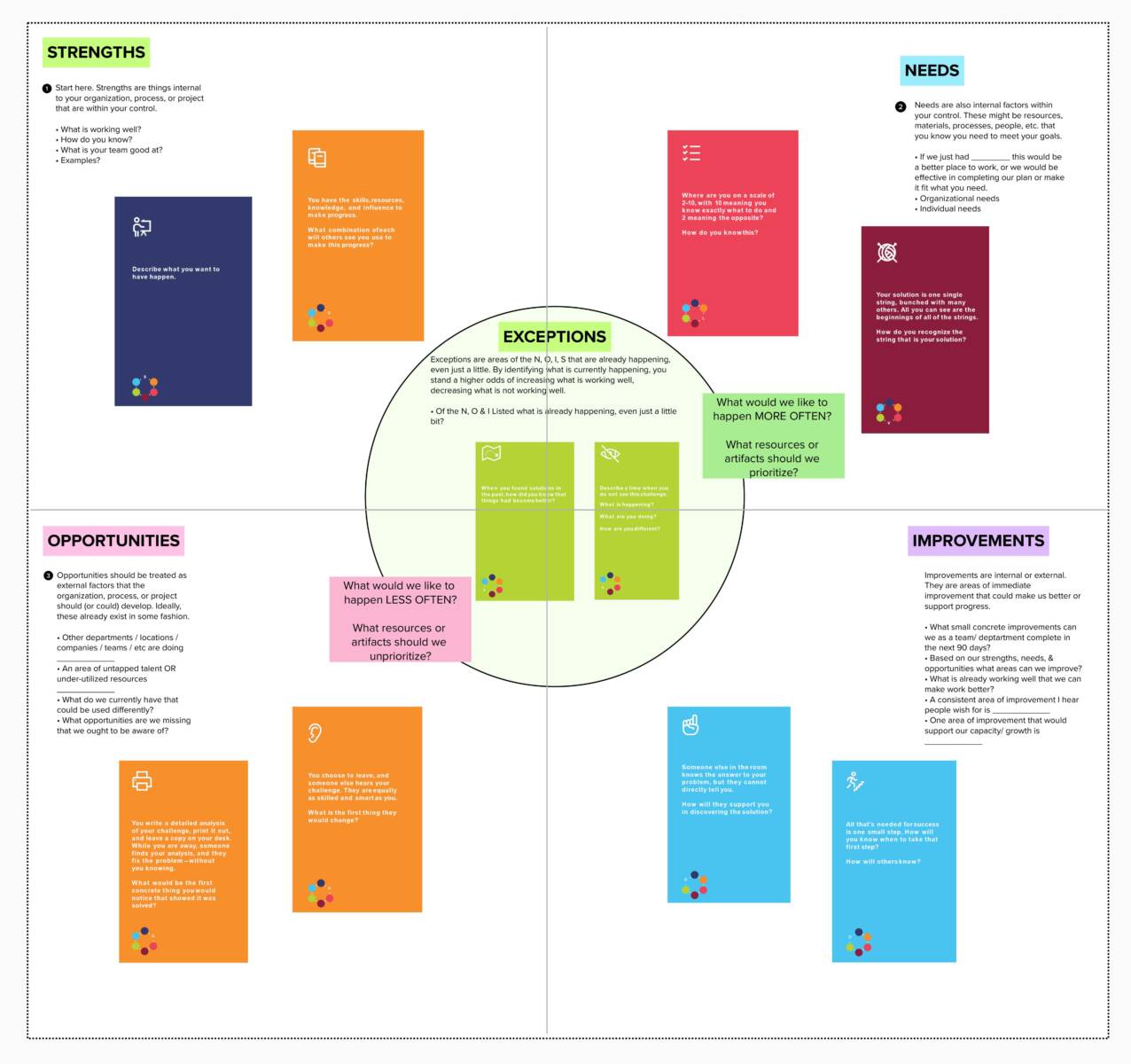
So… what you’re looking at are actually two different toolkits, being used in combination (which explains the explosion of colors!). Both of these are solution-focused things to think with, created for individuals, teams, and organizations.
The SOLVED Cards are a deck of solution-focused questions for reflections, organized into 6 suits: Situation, Observation, Level, Validation, Exception, Decision & Direction.
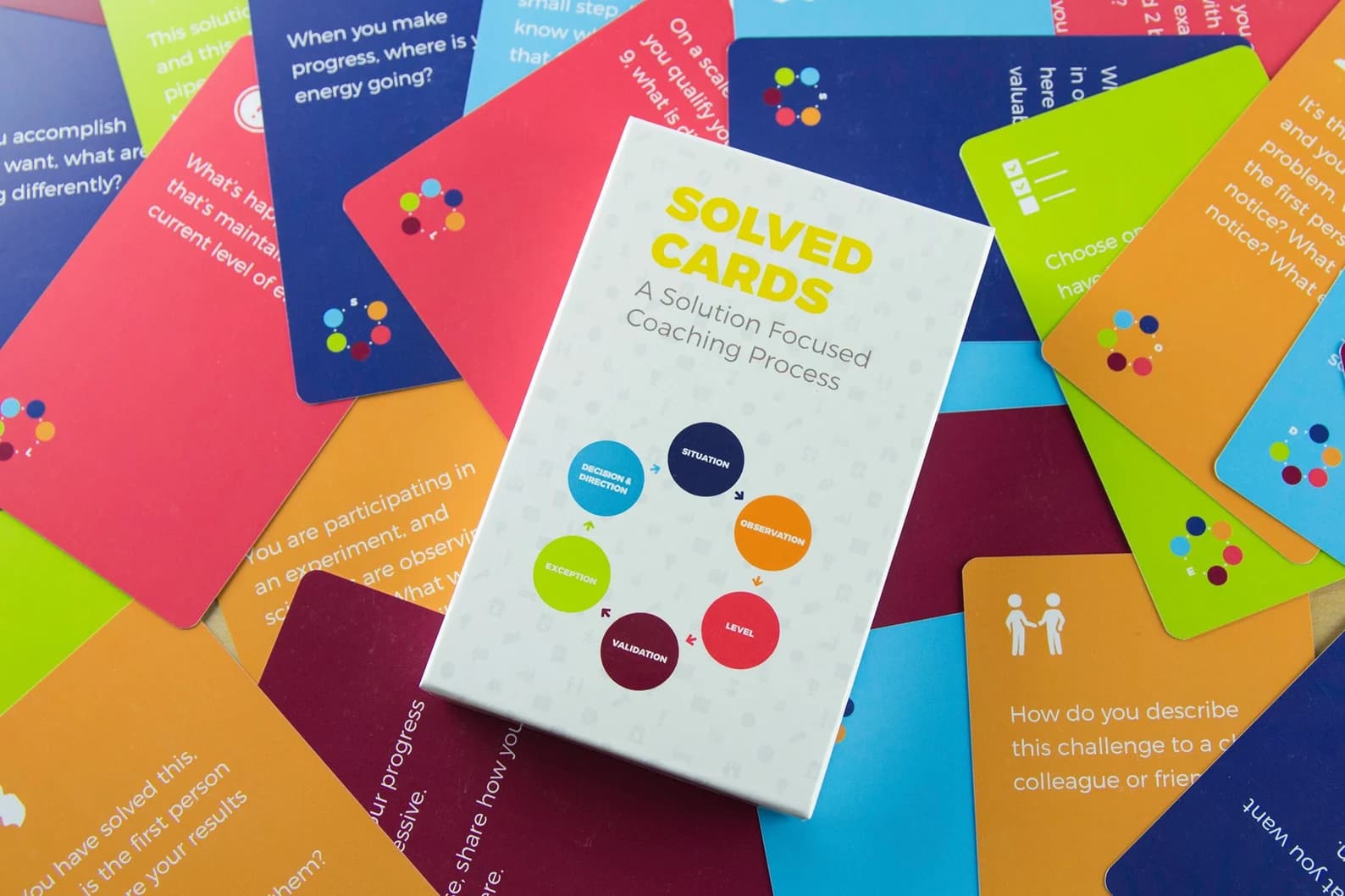
The “game board” in this case is the NOISE Analysis framework, which is a more solution-focused variation on SWOT Analysis (swapping out Threats and Weaknesses in favor of Needs, Improvements, and Exceptions).
Combining these two toolkits—after a wee bit of mapping, detailed in this post NOISE Analysis and SOLVED Cards: A Solution-Focused Approach to Strategic Planning and Organizational Growth—leads to a framework supported via questions for reflection.
Now I’m thinking about existing card decks I own that could be extended with a framework or canvas of some kind… 🤔
How Economics Fails to Account for the Climate Crisis
Here’s an essay to add to your read later list: “How captured economics stole our climate — and what we can do about it.”
This is not a playful thing to think with. Rather, it is something to think about: The discipline of economics’ role in our failure to halt global warming. More specifically, this essay makes a strong case for systemic bias in the field of economics (and adjacent roles) that makes it challenging to account for broader (e.g. climate) concerns.
Above all, it’s about the ideologies, the mindsets and the culture within economics that has led it to be uniquely averse to criticism — and uniquely aligned with preserving the status quo — even when we’re talking about the fate of our planet.
Having read The Ministry for the Future, Kim Stanley Robinson makes a convincing argument that our current economic system is the biggest barrier to making real and meaningful climate change policies. Money makes the world go round, right? [Hard stop]. This thinking is especially bothersome to me, as this highlights a struggle to shift perspectives or think in systems, which is ironic given that macroeconomics has always been—for me—a great example of an incredibly complex system. But even how we trade sits inside an even larger planetary system.
While we’re on the topic of big, perspective shifting thoughts…
Two 🤯 ‘What If…?’ Questions
I’ve shared in the past the power of a great “What if…?” question as a thing to think with. A truly provocative question can create space for exploring the unimaginable. This week, I stumbled across two such provocative propositions:
1️⃣ What If We Made Advertising Illegal? Honestly, after reading this one, it seems like such a straightforward solution for so many woes. In systems thinking you look for leverage points that have outsized impact on change—making advertising illegal seems like it would do just that. Just imagine…
2️⃣ What if we had a library economy? (I can embed this one--it's a video!)
Closing Thoughts…
I frequently close out this newsletter by sharing odd, interesting, or random things I've come across.
This… is not that.
I need to share a few thoughts about the insane US tariff announcement, as it’s hit hard in a personal way.
Sometimes the best way to understand something so large and overwhelming, is to ground it in something small and personal. For me, this is board games. While the board game industry is tiny relative to things like cars and electronics, it is a good microcosm of what is happening at large—and it’s very, very bad. These two posts…
…both describe in painful detail how these tariffs affect manufacturing board games, why attempts to make games in the US have failed, and why this could be the end of crowdfunded games. [!] While this hits hard as a board gamer (and as a Kickstarter “Superbacker” 🤪), it hits hard in another way…
In nearly every issue of Thinking Things, I share some printed card deck or serious game. Many of the challenges that are true for board game manufacturing are also true for indie publishers, myself included.
As some of you may know, I am working on the 15th Anniversary Edition reprint of the Mental Notes Card Deck. While the Kickstarter launch is several months away, I am genuinely concerned about how to navigate these turbulent manufacturing realities.
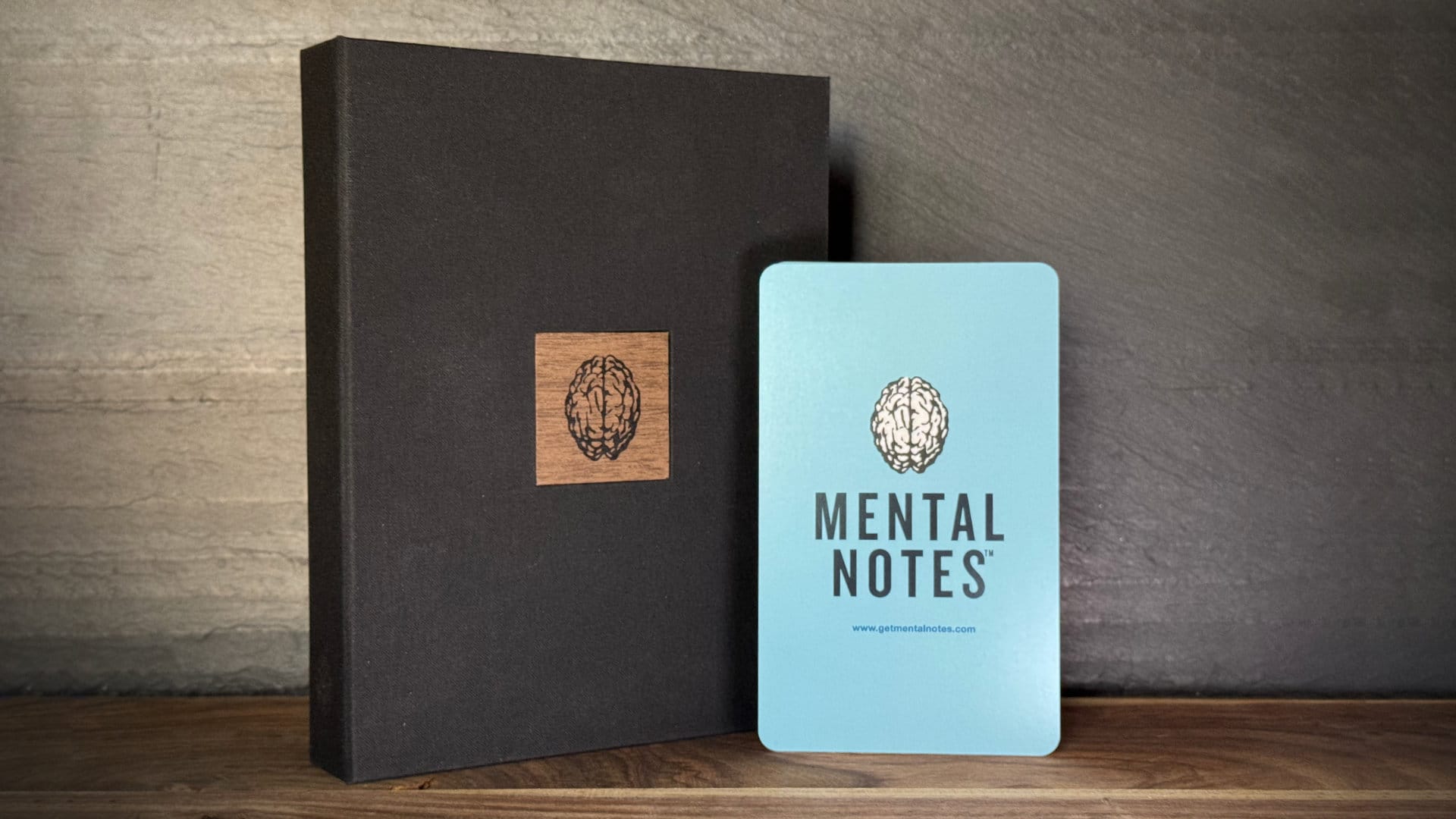
I'll be watching to see what happens, for many reasons.
😬 🤞
⁉️ Lest we end on a sour note, here’s something… random. Someone random, actually. I recently learned about Jack Parsons, “The Sex-Cult ‘Antichrist’ Who Rocketed Us to Space.” This guy was one bizarre (maybe bonkers is a better word?) individual. But, his life story makes for an interesting read. 🤪



